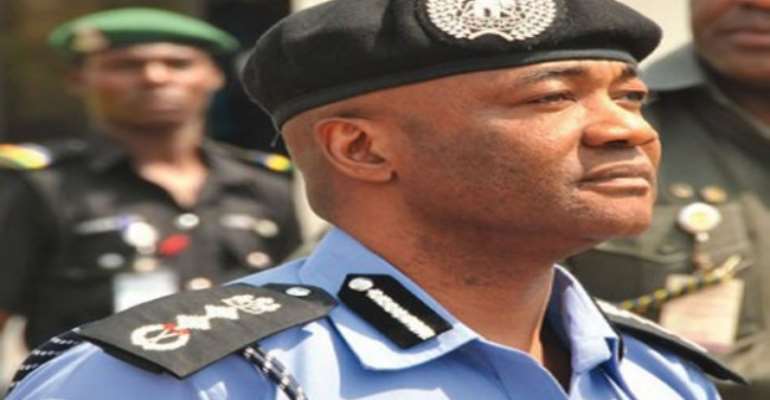Police abuse of right of assembly – Punch

In another brazen display of brute force, police in Rivers State on Wednesday, September 25, violently dispersed a peaceful gathering of defenceless teachers. Failing to proffer any convincing reason for the high-handedness, they are nevertheless still ranting on as if the right of citizens to peaceful assembly can only be at their discretion. It is left to Nigerians therefore to assert their constitutional rights and to the Inspector-General of Police to caution his unruly men.
According to reports, about 13,000 teachers newly recruited by the Rivers State government had gathered that morning at the Liberation Stadium in Port Harcourt, the state capital, in response to a directive by the state ministry of education that they should report there to collect their letters of posting. But, soon after, truckloads of heavily armed policemen arrived at the stadium and forcibly evicted the crowd. Others, including the state Commissioner for Education, Alice Lawrence-Nimi, were prevented from entering the stadium. We deplore this latest display of what Ibim Semenitari, the state's Commissioner for Information, described as 'impunity by retrogressive forces'. Subsequent attempts by the increasingly controversial Police Commissioner, Rivers State Police Command, Joseph Mbu, and his spokesmen to drape the victims in the toga of political protesters are unacceptable.
The victims and the state government insist that they were teachers assembling to collect posting letters. The police assertion that it received intelligence report that they were mobilised to stage a political protest 'against an important personality in the country' is neither convincing nor does it justify their action. When has it become a crime for aggrieved citizens to 'stage a political protest'? At best, it reinforces the accusation of the state government and opposition parties that Mbu is openly partisan.
Section 40 of the 1999 Constitution clearly spells out the inalienable right of Nigerian citizens to peaceful assembly. The framers of the constitution could not have envisaged that the provision: 'Every person shall be entitled to assemble freely and associate with other persons,' was a right that the Police could abridge at will. But to dispel any doubt about the sanctity of the law, the Supreme Court, in a landmark judgment in 2005, expressly voided provisions of the Public Order Act that required police permits for Nigerians to peacefully assemble in public as being inconsistent with the Constitution. The Act had been used by successive governments to deny Nigerians their right to peaceful assembly.
The government and its agencies cannot continue to be lawless. Mbu claimed that it was actually 18,000 people that gathered to protest. Even if they had gathered for such a purpose, he had no right to dislodge them as long as it was peaceful.
The IG, Mohammed Abubakar, may be gradually taking us back to the infamous days of the Second Republic when the police, under Sunday Adewusi, virtually came to be seen as the enforcement corps of the temporary wielders of power, violating human rights at will. Earlier on September 20 in Port Harcourt, about 600 youths from 11 states, participating in a programme jointly organised by the state government and Rotary Club, were prevented by police from visiting some project sites. Again, police quoted intelligence that they were being 'mobilised' for a protest!
But Police high handedness is not restricted to Rivers State. In Abuja, police have been enthusiastically shutting down the offices of a rival faction of the ruling Peoples Democratic Party. And in Ekiti State, Police fired bullets and teargas at a political gathering in Ado Ekiti, the state capital, where a member of the House of Representatives, Opeyemi Bamidele, attempted to address his supporters, despite giving several days' notice of the meeting. Across the country, police routinely break up meetings of some Igbo self-determination activists.
President Goodluck Jonathan and Abubakar should learn from our recent history and prevent the collapse of the Fourth Republic. When people are repressed from peacefully expressing themselves, dissent is driven underground to await an opportune time for violent eruption. The Human Rights Watch, in its 2013 report, detailed continued reports of human rights violations by the Nigeria Police, including extrajudicial killings, torture, arbitrary arrests and extortion. They have since escalated their penchant for breaking up peaceful protests.
Abubakar has the choice of leaving an enviable legacy of a modern, efficient, intelligence-led and courteous police force. Or he could take the convenient way of compromising professionalism and honour and opt for pleasing persons in power. He has the choice to serve Nigeria or serve individual interests.
Nigerians, on their part, should always stand for their rights or continue to bear the burdens of oppression. It took civil rights lawyer, the late Gani Fawehinmi, to spearhead the suits that affirmed our right to peaceful assembly; civil society groups must therefore wake up from their slumber and continue the noble struggle to make Nigeria a free, open and democratic society in name and in deed.
